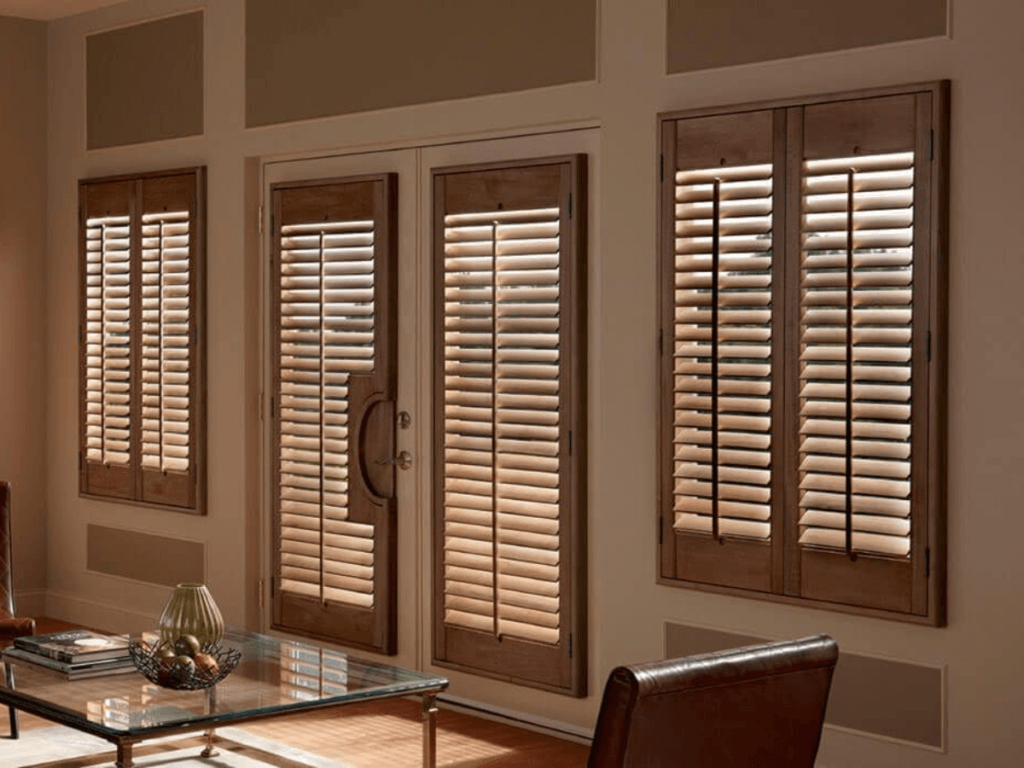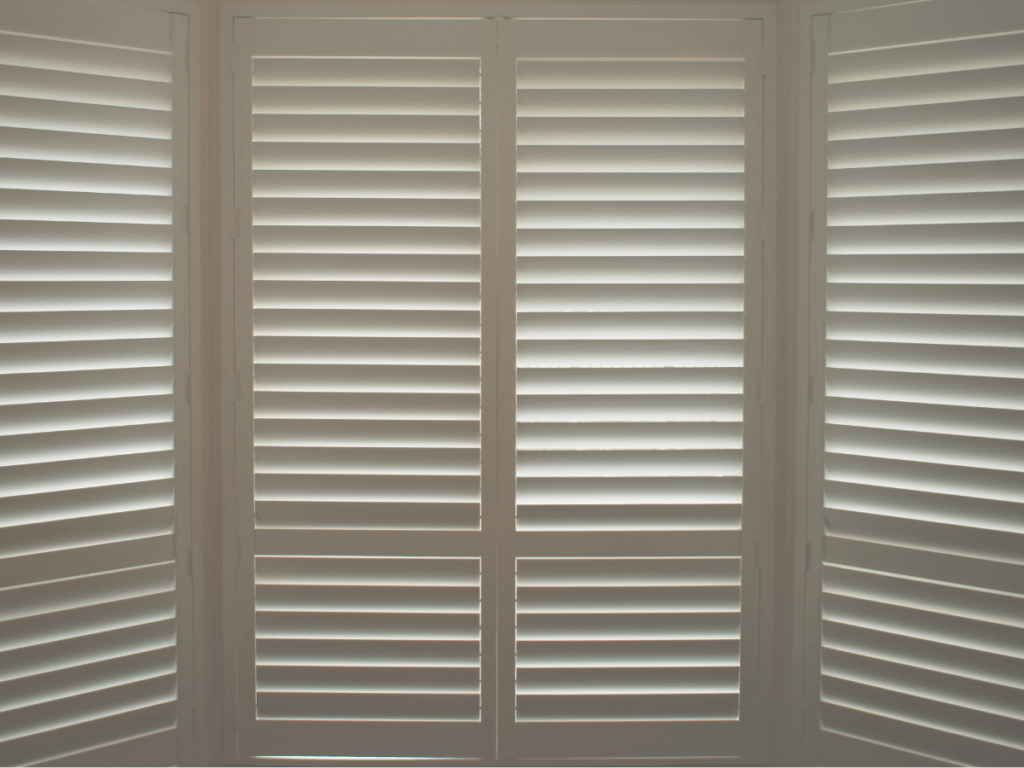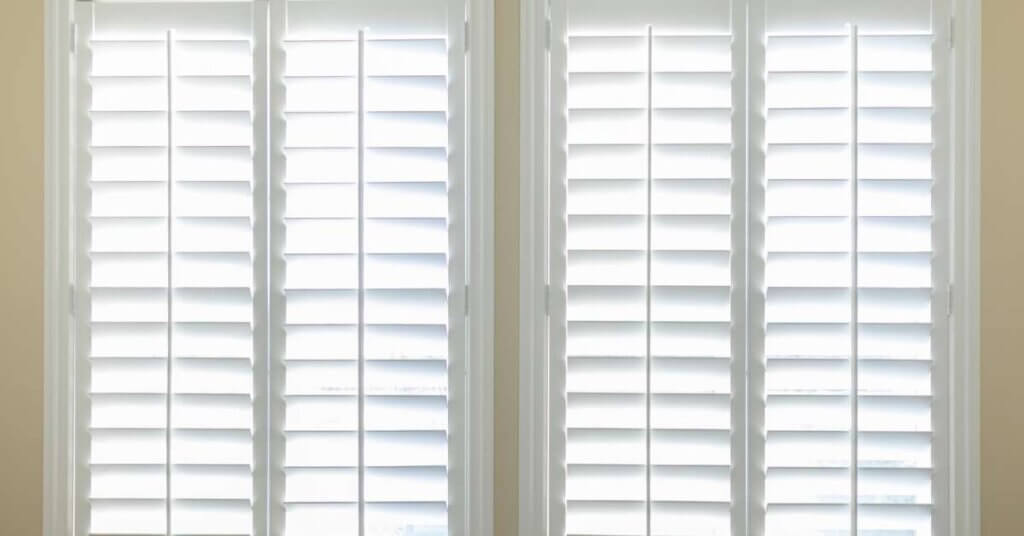Plantation shutters are timeless and elegant window treatments for your home. However, with various materials available, such as wood, composite, and vinyl, it can be challenging to determine which option is best for your specific needs. To assist you in selecting the ideal material for plantation shutters, let’s examine the advantages and disadvantages of each material.
Understanding the Different Materials
Wood Plantation Shutters

Wood plantation shutters are a timeless option with a cozy, organic appearance. Various wood types, such as oak, poplar, and basswood, are available for your preference. Wood shutters are customizable because they can be painted or stained to match your preferred style. Over time, though, wood is more prone to fading, warping, and cracking, particularly in high-moisture environments.
Composite Plantation Shutters

Composite plantation shutters are made from wood and synthetic materials, offering the best of both worlds. They are considered stronger and more moisture-resistant while still having the appearance and feel of wood. Compared to wood, composite shutters are less likely to warp, crack, or fade, making them a low-maintenance option.
Vinyl Plantation Shutters
Vinyl plantation shutters are a cost-effective and low-maintenance option. They are perfect for high-humidity areas like bathrooms and kitchens because they are incredibly resilient, moisture-resistant, and easy to clean. Vinyl shutters guarantee long-lasting beauty because they are resistant to fading and cracking. However, they may lack the natural warmth and texture of wood or composite shutters.
Factors to Consider When Choosing the Best Material for Plantation Shutters
When deciding which plantation shutters are the best for your home, consider the following factors:
1. Durability: Evaluate the material’s resistance to warping, cracking, and fading, especially if your shutters will be exposed to direct sunlight or high moisture levels.
2. Moisture Resistance: If you plan to install shutters in bathrooms, kitchens, or other high-humidity areas, choose a material that can withstand moisture without deteriorating.
3. Price: Consider your budget when selecting the material for your plantation shutters. Wood and composite shutters are more expensive than vinyl but may offer a higher-end look and feel.
4. Aesthetics: Choose a material that complements your home’s style and décor. Wood and composite shutters offer a classic, natural look, while vinyl shutters provide a more modern and streamlined appearance.
5. Maintenance: Consider the level of maintenance required for each material. Vinyl shutters are the easiest to clean and maintain, while wood shutters may require more regular upkeep to prevent warping and cracking.
Additional Considerations
Customization Options
When choosing plantation shutters, consider the customization options available for each material. Wood and composite shutters offer a wide range of colors, stains, and finishes to match your personal style. Vinyl shutters, while more limited in color options, still provide a variety of styles and louver sizes to suit your preferences.
Light Control and Privacy
Plantation shutters offer excellent light control and privacy, regardless of your chosen material. Thanks to the adjustable louvers, you can regulate how much natural light enters your room while still getting the privacy you want. Due to their versatility, plantation shutters are a chic and practical choice for any room in your home.
Energy Efficiency and Insulation
Plantation shutters made of wood or composite material have superior insulating qualities that keep your house cozy all year round. These shutters can increase a home’s energy efficiency by reducing heat transfer through the windows. Vinyl shutters, while not as insulating as wood or composite, still offer some energy-saving benefits.
Frequently Asked Questions about Plantation Shutters
1. Can plantation shutters be installed on any window?
Plantation shutters can be custom-made to fit most window types, including regular rectangular, arched, and French doors. Professional window treatment companies like MITS Little Rock can help you determine the best shutter configuration for your windows.
2. Are plantation shutters safe for children and pets?
Yes, plantation shutters are generally safe for children and pets. They do not have dangling cords or chains that can pose a safety hazard. The louvers and tilt bar are also designed to be sturdy and secure.
3. Do plantation shutters come with a warranty?
Many plantation shutter manufacturers offer warranties on their products. The length and terms of the warranty may vary depending on the material and manufacturer. Some companies even offer lifetime guarantees for added peace of mind.
Enhance Your Home with the Perfect Plantation Shutters
The ideal material for plantation shutters will depend on your needs, tastes, and financial situation. While composite shutters are more durable and resistant to moisture, wood shutters have a more traditional, natural appearance. Vinyl shutters are an inexpensive and low-maintenance substitute. Some factors to consider when selecting the best plantation shutters for your home are cost, lifespan, and resistance to moisture.
If unsure which material is best, speak with a qualified window treatment company like MITS Little Rock. If you have any questions, our team can assist you in selecting the perfect plantation shutters! Make the first move toward revamping your room by contacting us right now to arrange a consultation, and don’t settle for anything less than the ideal window treatment solution!



